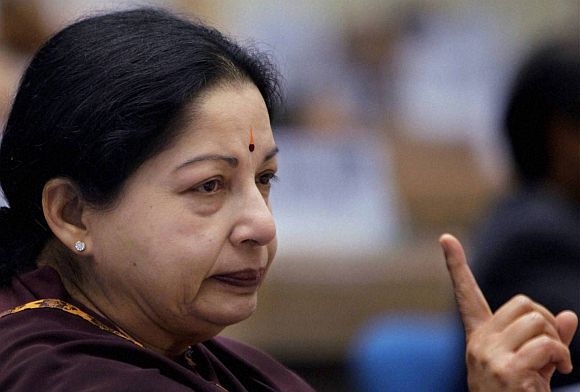 | « Back to article | Print this article |
'It stands to reason that if a CM is hospitalised for long durations, and is perceived to be not fully functional, that it is the governor's Constitutional duty to ascertain by diligent efforts and arrive at a dispassionate conclusion about the CM being physically fit and mentally alert to discharge his/her Constitutional obligations,' says B S Raghavan, the distinguished civil servant.

The hospitalisation of Tamil Nadu Chief Minister J Jayalalithaa entered the 13th day on October 4.
All indications are that her stay may be further extended. This holds the seeds of a Constitutional impasse.
There are mixed signals about the precise nature of Jayalalithaa's illness and the likely period of her stay in hospital.
The state governor came to the Apollo Hospitals on October 2, and according to the statement issued on his behalf, he visited the CM in the ward with a basket of fruits, was briefed in detail by the attending doctors and found her 'recovering well.'
There was no mention in the statement about her continuing to discharge her functions as the CM.
However, in their various interactions with the media, some members of the All India Anna Dravida Munnetra Kazhagam of which Jayalalithaa is the general secretary have said that she is attending to whatever official matters are being brought for her decision or instructions.
So far, there is nothing that dispels such a claim. It has, therefore, to be presumed that there is no breakdown in the running of the government and it is being carried on in accordance with the Constitution.
On the flip side, though, the Apollo Hospitals, where she has been admitted, has issued a statement that she is under respiratory support and under treatment for infection of an unspecified nature, and that she has been advised to remain in the hospital for a few more (number unspecified) days.
She is said to be responding to the 'comprehensive' course of treatment. The 'line of management' of her condition is said to have been discussed with, and endorsed by, Dr Richard John Beale, consultant intensivist of the London Bridge Hospital, who was flown in on September 30 from London and reportedly went back on October 2.
The London Bridge Hospital Web site mentions Dr Beale's areas of specialisation to be intensive care management, acute lung condition, acute respiratory distress syndrome, multiple organ failure, sepsis and clinical nutrition.
Any one of the above listed areas, other than clinical nutrition, even if it has even a remote relevance to the chief minister's condition, can involve prolonged hospitalisation, if a possibility of a recurrence is to be completely ruled out before discharging her.
An indefinitely prolonged stay in the hospital weakens the presumption about her attending to her duties, or even about her ability to do so.
It additionally raises the prospect of not only uncertainties in administering a complex state like Tamil Nadu, but also the CM's authority and power being used by others purporting to stand in for her.
There is no provision in the Constitution giving the prime minister or the chief minister the power to authorise on his or her own any other functionary or person to exercise his/her functions on their behalf.
Any such alternative arrangement will have to be by way of reassigning the portfolios and amending the rules of conduct of business with the governor/President's approval.
It stands to reason and common sense, therefore, whether it is the CM or the PM who is hospitalised for long durations, and is perceived to be not fully functional, that it is the Constitutional duty of the President or governor, as the case may be, to ascertain by diligent efforts (discussions with attending doctors, obtaining independent second opinion, making any further general inquiries from knowledgeable people) and arrive at a dispassionate conclusion about the CM or the PM being physically fit and mentally alert in the needed measure to discharge his/her Constitutional obligations.
If that conclusion is that of the state or the country heading for a situation militating against the smooth running of administration or resulting in a Constitutional breakdown, it is equally the bounden duty of the governor or the President to have the incumbent replaced.
This may be done either by calling upon the political party whose elected leader he or she is to elect another leader, and appoint him or her as the CM/PM, or by choosing a person in his discretion who is likely to command a majority support in the state assembly or Parliament.
The Jayalalithaa instance points to the urgent necessity of incorporating in the Constitution an amendment laying down the responsibility on the governor/President somewhat on the lines stated above to get over similar piquant situations in future.
It is worth recalling here that there was a similar lacuna in the US constitution in respect of disability of the US president to discharge his duties and functions. It was plugged by the 25th amendment only on February 10, 1967, nearly 200 years after the adoption of the original constitution.
By virtue of the amendment, 'Whenever the vice-president and a majority of either the principal officers of the executive departments or of such other body as Congress may by law provide, transmit to the President pro tempore of the Senate and the Speaker of the House of Representatives their written declaration that the President is unable to discharge the powers and duties of his office, the vice-president shall immediately assume the powers and duties of the office as acting President.'
B S Raghavan is a retired IAS officer who served as the Director, Political and Security policy planning, in the home ministry between 1961 and 1969, and headed the National Council Secretariat under Jawaharlal Nehru, Lal Bahadur Shastri and Indira Gandhi.